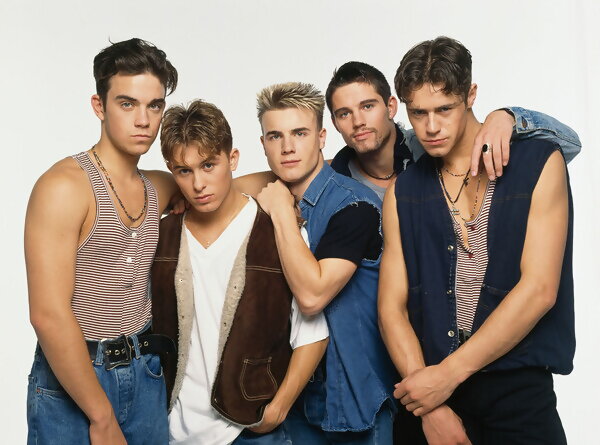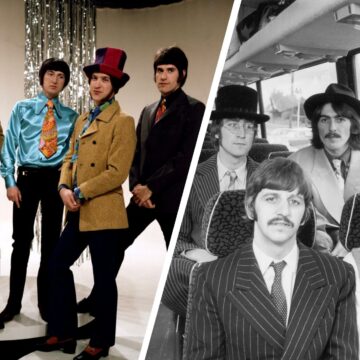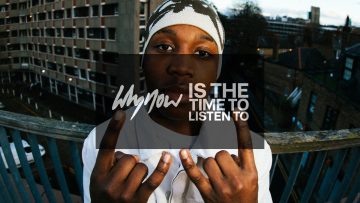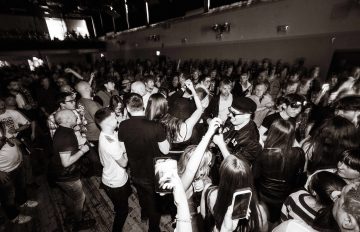What ever happened to boy bands?
Boy bands used to be cool, but they aren’t anymore. The arrow of time travels in one direction – from cool to cringe. And entropy has done a real job on boy bands. If five bleach-blonde guys calling themselves Boyzone popped up today, they wouldn’t make it out of the local circuit. But in the 90s, you couldn’t imagine anything so wicked. A gang of metrosexual men singing about love? Very cool, we thought. But in the 2020s, the only room for Boyzone is as an X-rated domain name.
READ MORE: Boyzlife to McBusted via Cream: 8 Notable Supergroups
West Life, Take That, Blue, and the rest have all fallen victim to entropy’s rule of cool. But it’s not just those particular bands – the entire genre has gone with the wind. The boy band is as much in history as your dad’s fabled treks to school through the elephant graveyard or a functioning health service. The terminus is inevitable, as per the rule of cool, but the how and why of it all, is not.
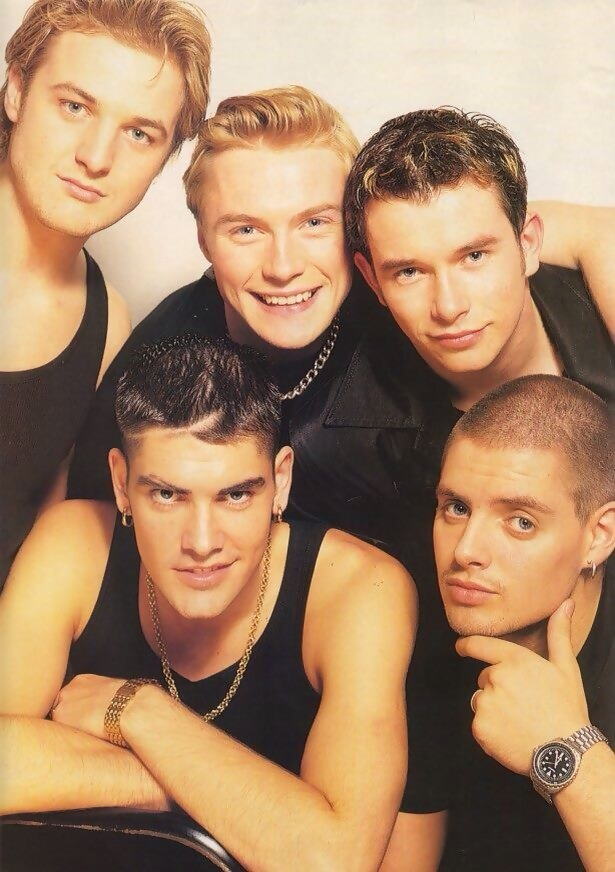
A fresh-faced Boyzone, one of Louis Walsh’s greatest achievements (in his eyes, at least)
Why were boy bands popular in the 90s?
The nineties were a time for optimism. Enduring peace, a booming economy, and the year 2000 – the future – on the horizon. The greyness of the 80s: grey-looking people in grey-looking northern towns, fighting with the police about grey mines, that was all in the past. This was the height of the dot-com bubble, with cheap money abound and cushy office jobs with water coolers for the masses.
And, as always, you could read the runes of culture clearly in its music. Just as Joy Division was telling you something about Manchester in the 1980s, Take That was a weather vane for the 90s vibe.
As individuals, we rose to the moment, presenting ourselves as fit and proper for the prosperity we had inherited. The term metrosexual itself was first coined in 1994, used to describe a man who had ‘taken himself as his own love object and pleasure as his sexual preference’.
Women were augmenting themselves too. This was the ascendant age of models like Jodie Marsh and Jordan and the popularising of the boob job and Botox. We actually became so perfect as to start reacting with the intuit of an allergy against our own veneers, ripping our own jeans or fraying our sleeves to not become too uncanny.
READ MORE: From S Club 7 to Central Cee | Why was 90s music so happy compared to now?
And boy bands were a product of this fake culture. Unlike famous bands of the 70s and 80s – which were formed by lads getting together in the local over a shared dislike of heavy industry or the Tories – many of the 90s boy bands were more like a creation of Professor Utonium. Boyzone was formed after Louis Walsh put an advert in a newspaper, with the Irish music manager auditioning more than 300 people before finalising the lineup. Take That was designed as the UK’s answer to New Kids on the Block, and formed after rounds of auditions to curate the thing to a T.
Punters weren’t really in the market for authenticity in the 90s – America had Nirvana, but we’re always a decade downstream of the Atlantic.
You can blame the Tories for everything (including bad music)
If you hadn’t caught up with fake culture by the noughties, you were getting a prod. The nation’s gay best friend, Gok Wan, was given his own show to tell women to stop being frumpy, wear more makeup, and tuck their bellies in. You might even remember Fat Club, later restyled as Celebrity Fit Club, where people (as so described by the title) were traduced in front of cameras at weekly weigh-ins during their weeks-long quest to lose weight.
There was Ladette to Lady; How Clean is Your House?; Essex Wives; Cosmetic Surgery Live; Faking It; and about a dozen other ‘self-help’ reality TV shows that could never be broadcast today. Even your car had to get in on it, with Xzibit and Tim Westwood putting sexy bodies on top of your Toyota Corolla. But before long the nasty Tories were back in power and everyone was skint again.
It’s not surprising that the BBC’s Snog Marry Avoid? first aired in 2008, the year of the financial crisis. The show, which revolved around Page 3 wannabees being given a literal dressing down – paraded women down the High Street to be publicly mocked like medieval criminals. This was the state broadcaster putting a bookmark in a chapter of our history. The 2010s had arrived and it was time for poverty porn like Can’t Pay? We’ll Take It Away; Benefits Street; and Jeremy Kyle. And this new wave needed an appropriate soundtrack to accompany it.
READ MORE: Sinéad O’Connor | Nothing compares to one of the true few anti-conformists
No country for young men
As with the rest of 90s pop culture, the optimism of the boy band could not survive in this new world. This was a time for authenticity, like Ken Loach films about people being sanctioned for arriving late to the job centre, or social media videos of people being stabbed. Grange Hill was another victim of 2008, cancelled in large part because CBBC programming guidance couldn’t depict what was actually happening in our state schools. Young people wanted a culture they could relate to.

BBC’s Snog Marry Avoid?
Take a look at the drink-driving data – it has fallen precipitously since the 70s. Partly because people don’t drive after drinking, but also because they don’t drink anywhere near so much. Then, take a look at drug driving convictions – they have doubled year on year since 2018. It’s no surprise, then, that drugs play such a prominent role in today’s music. This is the Family Guy principle, people finding enjoyment in sludge because they get the reference. What do ripped jeans and blonde highlights signal today? An alien world in which you didn’t have to worry so much about ‘looking hard’, or footing the heating bill.
Gritty is the new pretty
What’s in a name? The term ‘boy band’ is evocative of Robin Hood and his merry men, or of youth and vigour – the grime and drill genres which followed tell you everything you need to know about them. They reflect a new, grey era in which people are content to wallow.
In such a time, you can either go above like the Teddy Boys or below like the streetwear enjoyers. There is an ‘everything is shit, and that’s just how it is’ quality to today’s top 40. Grittiness, even dirtiness, is the new cool, with love songs, boy bands, and this whole carnival show which had preceded the present, consigned to the status of a cringe artefact of a silly history.
But by binning the boy band in search of something more real, we might have chucked the bullion in favour of fool’s gold. No, the 90s and the noughties were not as good as the culture at large pretended it was. Not everybody was actually middle class. Ken Loach was even then making films about poverty (although, to be fair, mostly they were set in Scotland and Ireland), and crime was still a problem (remember ASBOs?). It was, in large part, a pretence; we were keeping up appearances.
But that energy, in the music and in the culture more widely, has a certain nobility to it. It is a demonstration of an intent to be the best you can be, and an attempt to manifest that best self by performing as him. As S Club 7 once said: Reach for the stars, And when that rainbow’s shining over you, That’s when your dreams will all come true. Maybe that is cringe, but it is more real than: ‘Uh-huh, uh-huh, uh, Uh-huh, uh-huh, uh, Uh-huh, uh-huh, uh, Uh-huh, uh-huh’ – Kenya Grace.
Want to write about music? Pitch us your ideas.
Are you passionate about music and have a story or hot take to share? whynow wants to hear from you. Send your music-focused pitch to editors@whynow.co.uk. Let’s make some noise together.

